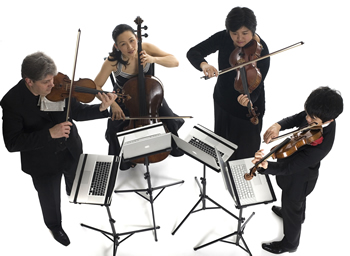The search for a music director to succeed Christof Perick is a major focus of the Charlotte Symphony Orchestra’s current season. Guest conductor Edwin Outwater, despite his very youthful appearance, has racked up a very impressive resume. He graduated cum laude in 1993 from Harvard with a degree in English Literature and got his master’s degree in conducting from UC Santa Barbara. An early appointment as Resident Conductor of the Florida Philharmonic brought him to the attention of Michael Tilson Thomas. The well-known West Coast music director selected Outwater as his assistant, first with Thomas’ renowned Florida-based training orchestra, The New World Symphony, and then as Resident Conductor for the San Francisco Symphony. Outwater’s work in music education and community outreach has been widely acclaimed. He began his tenure as Music Director of the Kitchner-Waterloo Symphony in Ontario, Canada, in September 2007.
Outwater’s Charlotte program was unusual, consisting of five selections instead of the usual menu of overture, concerto, and a major symphony. Prior to the concert, he commented that he had been asked to fit his program to cover mostly French repertory with a little Mozart. He said it emphasized harmony as expressed in musical color. Outwater conducted with confidence and with economy of gesture. His beat was clear and he got tight ensemble within and among all the sections of the orchestra. He achieved refined, quiet playing that was very striking. His choices for instrumental color were fastidious, precise, and stylish. He retained Perick’s antiphonal seating of the strings with first violins, cellos, and double basses on the conductor’s left and the second violins and violas on his right.
Mozart’s Symphony No. 10 in G, K.74 (1770), is a pleasant work composed during the teenage composer’s Italian tour. It shows how well the youth had incorporated the dominant style of his contemporaries; it has few individual touches. Mozart is a good test for conductors and orchestras since the composer gives no cover for mistakes. Perick’s emphasis on programming Haydn and Mozart has honed the Charlotte Symphony musicians’ technique, but it remains for a guest conductor to demand exact intonation and ensemble. Clean, clear string section articulation showed Outwater had gotten these qualities from them. Everything was spick and span, and the graduation in dynamics was most carefully realized. A subtle left-hand beat brought out a clock-like pizzicato accompaniment from the violas.
Hector Berlioz (1803-69) was a master and pioneer of orchestration and a wild musical visionary. Two selections — the “Love Scene” from Roméo et Juliette, Op. 17, and the “Rakoczy March” from The Damnation of Faust, Op. 24 — explored the radical extremes of the composer’s style. Outwater lavished a cultivated palette of orchestral color and discerning taste for dynamics in the “Love Scene,” which built up from a hushed pp to a searing, passionate climax. The cellos and, especially, the violas deserved the conductor’s acknowledgment. Along with the woodwinds, these inner voices made major contributions to the success of the piece. The “Rakoczy March” gave the percussion and the brass sections a chance to cut loose. The rousing performance was well received.
Pianist William Wolfram joined Outwater and the orchestra for the Symphonic Variations for Piano and Orchestra of César Franck (1822-90). The orchestra and the guest conductor melded meticulous qualities already mentioned into a finely balanced and judged accompaniment. Wolfram’s interpretation had considerable imagination and vitality.
Outwater’s refined approach to the Berlioz “Love Scene” was played out on a larger scale in the concert’s concluding work, the 1919 Suite from the ballet The Firebird by Igor Stravinsky (1882-1971). The full ballet premiered in 1910; the composer later drew up three concert suites. This version consists of six selections: Introduction, Dance of the Firebird, Round Dance of the Princesses, Infernal Dance of King Kashchei, Berceuse, and Finale. The dynamics ranged from the Introduction’s dark, hushed sounds of the low strings with a pulse from the bass drum, more felt than heard, to the shattering, guillotine-like orchestra forte that opens the Infernal Dance. Outwater’s mastery of phrasing and style was everywhere evident. There were several fine solos by principal players including Concertmaster Calin Ovidiu Lupanu, cellist Alan Black, oboist Hollis Ulaky, and harpist Bette Roth.
Outwater has set the bar high for his fellow candidates. If the Charlotte Symphony organization can turn around the effects of five seasons of deficits culminating in a debt of about $1.5 million, its artistic future can be bright.











